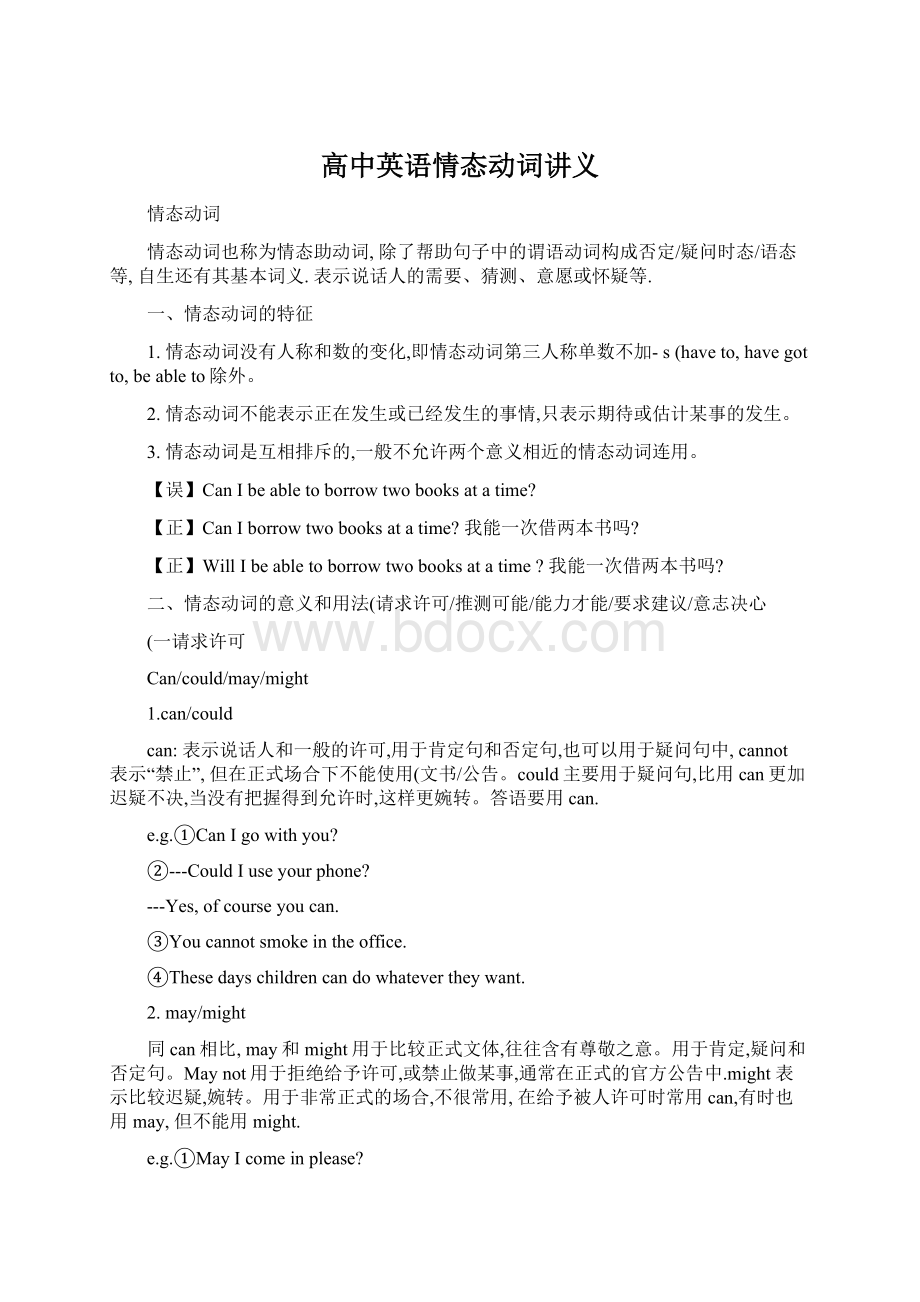高中英语情态动词讲义Word文档格式.docx
《高中英语情态动词讲义Word文档格式.docx》由会员分享,可在线阅读,更多相关《高中英语情态动词讲义Word文档格式.docx(8页珍藏版)》请在冰豆网上搜索。

e.g.①MayIcomeinplease?
②IwonderifImightspeaktoyourson.
③---MayIturnontheCDplayer?
---No,youmaynot/cannot/No,youmustn'
t.(具有强烈禁止的意思(不可说:
No,youmightnot
④Anybookmaynotbetakenoutofthelibrary.
⑤Carsmaynotbeparkedinfrontofthehall.
总结:
表示请求许可是can/could/may/might礼貌程度依次递增.肯定回答常用:
Yes,youcan/may.否定回答常用:
Sorry,Iamafraidnot.或I’dratheryoudidn’t或No,youmaynot/cannot.
3.must:
一般用于否定句。
mustnot比maynot更为强调。
e.g.Youmustn'
tplayfootballinthestreet,children.
4.shall:
一般用于第一,三人称疑问句中
e.g.①ShallIopenthewindow?
②Shallhecometoseeyou?
肯定回答,一般是ofcourse;
certainly;
yes,please。
否定回答,一般是no,thanks。
5.will/would:
一般用于第二人称,would更客气。
e.g.Will/Wouldyouspellyourname?
(二推测可能
1.can/could:
1表示逻辑上或理论上的普遍的或者偶尔的可能性,而不是某种实际上将要发生或正在发生的可能性,并非说话人的主观猜测。
e.g.①Anybodycanmakemistake.(普遍性
②Theweatherherecouldbeverycoldinwinter.(偶尔的
2说话人主观的猜测“可能”,多于be连用。
多用于疑问句或否定句中。
Can和could没有事态的差别,只是
could不太肯定。
e.g①Hecan'
tbeathome.
②Canthenewsbetrue?
注意:
不表示某事实际发生的可能
e.g.Itcanrainthisevening.(误
表示事实上的可能,某事未来或正在可能要发生。
might表示的可能性比may小一些。
一般用于肯定和否定陈述句:
May+do/bedoing
e.g.①Itmay/mightraintomorrow.明天可能下雨。
②Let’sspeedup.Theymay/mightbewaitingforusnow.
和cannot的区别:
(maynot:
可能不;
cannot:
不可能
e.g.①Hecan'
tbeathome.他不可能在家。
②Hemaynotbeathome.他可能不在家。
用法比较:
might/may/could/can表示可能性时的从小到大
e.g.Youmight/may/could/canberight.(可能性:
30%-40%-50%-60%
3.must:
一般用于肯定句,否定句或疑问句中用can代替(cannot/Can…?
1表示说话人的对现在/正在进行/将来的动作或状态非常肯定的有根据的推测。
Must+do/bedoing
e.g.①Youmustbeill.Icanseeitformyourface.
②Somethingmustbeburning.Icansmellit.
③Bellmustbeleavingtomorrow.
2表示根据逻辑必须发生的事。
e.g.①Allmenmustdie.人都是要死的。
②Wintermustbefollowedbyspring.冬天到了,春天还会远吗?
4.will/would
1表示说话人对将来和现在的预测。
e.g.Ithinkhewill/wouldbeallrightnow.我想他现在一定好了。
2有时表示某种倾向和习惯性。
Woulddo可表示过去常常。
e.g.①Oilwillfloatonwater.油浮在水面上。
②Whydon’tyouputthemeatintherefrigerator?
Itwillstayfreshforseveraldays.
③Hewouldgetupveryearly.过去他常常起的很早
5.oughtto:
一般用于肯定。
e.g.①Theyoughttobetherebynow.他们现在一定到那了.
②Theyoughttowin-theyhavetrainedhardenough.他们应该能赢,他们训练的够苦的。
6.shall/should:
表示说话人的猜测,多指预期的事,表示:
估计应该/按道理应该。
e.g.①Ishallberichoneday.总有天我会发财的。
②ThatshouldbeJanetcomingupstairsnow.正在上楼的准是珍妮特。
(三能力才能
can/could/beableto:
表示人或动物的内在能力。
有某种知识或者技能而能够做某事。
用于肯定,否定和疑问句。
e.g.Hecan/isabletospeaktwoforeignlanguages.
can与beableto用法上的区别:
1.can只有两种时态,即can和could;
而beableto有将来式,完成式等多种时态。
但二者均无进行时态。
e.g.①I’llbeabletodrivethecarinaweek.
②Tomhasbeenabletodrive.
2.表示过去通过努力终于做成了某事要用beableto,而不能用can。
如:
E.g.Iwasabletoswimtothebankaftertheboatturnedover.
3.can是情态动词,只能用作谓语成分,beableto是普通动词短语,既可以作谓语,也可以作非谓语。
e.g.BeingabletospeakEnglishfluently,hehasnodifficultyincommunicatingwiththeAmericansattheparty.
4.beableto后边接动词不定式表示一种实际情况时,其否定形式不是benotableto,而是cannot。
e.g.---Wereyouabletocatchthefirstbusyesterdaymorning?
---No,Icouldn’t.
5.一般说来,beableto后边的动词不定式没有被动语态。
e.g.I’msureheisabletocorrecthismistakesingrammar.
不说:
*I’msurehismistakesareabletobecorrectedbyhim.
6.Beableto前面可以加can以外的情态动词。
E.g.①Youmightbeabletopersuadehim.
②Ioughttobeabletoliveonmysalary.
7.could经常和动词see,hear,smell,taste,feel,remember,understand等连用。
不用wasableto
e.g.①Whenwewentintothehouse,wecouldsmellsomethingburning.
②Shespokeinaverylowvoice,butIcouldunderstandwhatshesaid.
8.在谈论说话时发生的动作,用can,不用beableto。
【误】Look!
I'
mabletoswim.
【正】Look!
Icanswim.看,我会游泳了!
(四要求建议
1.must:
1用于肯定句,表示说话人的意志和义务。
或要求对方必须作某事。
2疑问句用于征求说话人的意见。
肯定回答用:
Yes,youmust.否定用needn'
t或don'
thaveto
---MustIfinishmyhomeworktoday?
---Yes,youmust./No,youneedn’t./No,youdon’thaveto.
1may用于法律和条约,相当于shall。
用的较少。
e.g.Aciviljuristicactmaybeinwritten,oralorotherform.
民事法律行为可以采取书面形式、口头形式或者其他形式(《中华人民共和国民法通则》第56条。
2might用来对人们提出建议,可以用来提出批评,不能与may替换。
e.g.Youmighthaveconsideredyourparents’feelings.
3.Shall/should
Shall:
1用于第二/第三人称作主语的陈述句中,表示给对方的许诺,命令,警告,威胁。
E.g.①Youshallgetananswerfrommetomorrow.
②Thechildrenshallgetagiftiftheyarenice.
③Youshallbepunishedforwhatyouhavedone.
2用于第三人称作主语的陈述句中,在条约,规定,法令等文件中表示义务和规定,表示“应该,必须”
e.g.Allpaymentshallbemadeincash.
Thosebelongingtoourschoolshallwearuniform.
Should:
表示义务,责任,提出建议
e.g.①Today’schildrenshouldlearntorespecttheirelders.
②Weshouldtakegoodcareofthelittlekids.
③ShouldIhelpyouwiththecommunityaffairs?
3Oughtto
oughtto强调在客观上(法律,章程和道义(或者是自己的意见听上去像法律和义务一样有力,比should语气强。
e.g.①YououghttogoandseeMarytomorrow..明天你应该去看玛丽。
②Weoughttodefendourcountry.我们应当保卫我们的国家。
(每一个公民应尽的义务
(五意志决心
will/would:
可表示意志、愿望和决心,用于各种人称陈述句。
will表示意愿或决心时,可用于条件状语从句。
e.g.
e.g.①Iwilldoanythingforyou.
②Iwillnevertellyouthesecret.
③Theywouldnotlethiminbecausehewaspoorlydressed.
④Ifyouwillgiveupsmoking,yourhealthwillimprove.如果你愿意把烟戒掉的话,你的健康状况就会好转。
三.情态动词特殊用法
1.May+主语+动词原形表示祝愿。
e.g.①Mayyousucceed.祝你成功
②Maythatdaycomesoon.希望这一天早日到来。
2.must有时可用来表示“偏要/非得”的意思。
e.g.①Whymustitraintoday?
为什么偏偏在今天下雨?
②WhenIwastakinganap,astudentmustknockatthedoor.正当我午睡时,偏偏一个学生在这个时候来敲门。
3.should表示说话人的惊奇,愤怒,失望的特殊情感,意为:
居然/竟然
e.g.①HowshouldIknowwhereyou’veleftyourbag?
②Iamsurprisedthatyoushouldtalkwithmelikethat.
4.can用在否定句和疑问句中表示惊讶。
e.g.①Howcansuchasimplemealcostssomuch?
②Thiscannotdonebyhim.
四.情态动词的习惯用法:
1.Can的习惯用法:
1cannothelpdoingsth:
情不自禁
2canbutdo:
只好
3cannot(helpbutdosth:
不得不
4cannot/cannever…too:
无论…也不过分
e.g.①IcannothelpthinkingofhimwhenIamlonely.
②Wecanbutdoourbest.
③Thegirlcannot(helpbutliveonherself.
④Youcanneverdotheworktoowell.
2.may的习惯用法:
1may(mightwell:
很可能
2may(mightaswell:
最好,倒不如
3.may/might…but…:
我承认…是事实,但是…
e.g.①Hemay/mightwellbeinthehouse.他很可能在房子里。
②Thereisnothingtodo,soImay/mightaswellgotobed.
③Itmayraintomorrow,butwe’vebeendetermined.
4.dare的习惯用法:
1Idaresay:
表示猜测,意为:
我相信,我认为,很可能
2Howdareyou/he/she/they:
你怎么敢?
E.g.Idaresayyouareright.
Howdareyoucomeinwithoutknockingthedoor?
五.情态动词+bedoing:
推测现在正在发生或存在的状态。
1must+bedoing:
用于肯定句中,表示“一定正在”
2Can/can’t+bedoing:
用于疑问句/肯定句中,表示“可能正在…吗?
/不会正在…”
3Could+bedoing:
用于疑问句/否定句/肯定句中,might肯定程度稍低,表示“可能正在…”
4may/mightbe+doing:
用于肯定句中,表示“可能正在…”
e.g.①Hemustbedoinghishomeworknow.
②Canshebestillworking?
③Hecannotbestillworking
④Thereisnostudentintheclassroom.Theycouldbeplayingintheplayground.
⑤Shemay/mightbewritingalettertoherparentsnow.
六.情态动词+havedone,这种结构有两个主要的用法。
(一表示对过去发生的动作或状态的推测或估计
1musthavedone:
表示“一定/准是”只用于肯定句
2may/mighthavedone表示“大概已经”
3Can/Couldhavedone表示“可能已经…了吗?
”用于疑问句。
4can’t/couldn’thavedone表示对事情真实性不相信“不可能吧”couldnot更委婉些。
e.g.①Thestreetsarewet.Thestreetmusthaverained.
②Theymay/mighthavetakenalatertrain.
③Idon'
tknowwhyshedidn'
tcallmeyesterday.Can(Couldshehaveforgottenmytelephonenumber?
④Hecannot/couldn’thavegonehomebecauseIsawhimontheplaygroundjustnow.
(二虚拟过去,表示后悔/惋惜等感情
1couldhavedone表示“本可以通常用于肯定句。
2mighthavedone表示“本可以通常用于肯定句
3needn'
thavedone表示“本没有必要”只用于否定句。
4daren’thavedone表示做了原本不敢做的事,只用于否定句。
5should/oughttohavedone表示“本该”。
用oughtto责怪语气更强烈。
6shouldn’t/oughtn’thavedone表示“本不该做却做了”。
e.g.Wecouldhavewalkedtothestation.Itwastoonear.
Youmighthavetoldhimearlier.Heisangrynow.
Youneedn’thavewaitedforme.
Hedidn’tpasstheexam.Hedaren’thavegonehome.
Youshould(oughttohavebeenheretenminutesago.
Ifeltveyhot.Ishouldn’t(oughtn’thaveworntheovercoat.